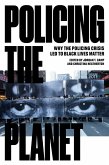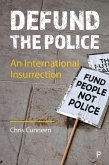The massive uprising following the police killing of George Floyd in the summer of 2020--by some estimates the largest protests in US history--thrust the argument to defund the police to the forefront of international politics. It also made The End of Policing a bestseller and Alex Vitale, its author, a leading figure in the urgent public discussion over police and racial justice.
As the writer Rachel Kushner put it in an article called "Things I Can't Live Without", this book explains that "unfortunately, no increased diversity on police forces, nor body cameras, nor better training, has made any seeming difference" in reducing police killings and abuse. "We need to restructure our society and put resources into communities themselves, an argument Alex Vitale makes very persuasively."
The problem, Vitale demonstrates, is policing itself-the dramatic expansion of the police role over the last forty years. Drawing on first-hand research from across the globe, The End of Policing describes how the implementation of alternatives to policing, like drug legalization, regulation, and harm reduction instead of the policing of drugs, has led to reductions in crime, spending, and injustice. This edition includes a new introduction that takes stock of the renewed movement to challenge police impunity and shows how we move forward, evaluating protest, policy, and the political situation.
As the writer Rachel Kushner put it in an article called "Things I Can't Live Without", this book explains that "unfortunately, no increased diversity on police forces, nor body cameras, nor better training, has made any seeming difference" in reducing police killings and abuse. "We need to restructure our society and put resources into communities themselves, an argument Alex Vitale makes very persuasively."
The problem, Vitale demonstrates, is policing itself-the dramatic expansion of the police role over the last forty years. Drawing on first-hand research from across the globe, The End of Policing describes how the implementation of alternatives to policing, like drug legalization, regulation, and harm reduction instead of the policing of drugs, has led to reductions in crime, spending, and injustice. This edition includes a new introduction that takes stock of the renewed movement to challenge police impunity and shows how we move forward, evaluating protest, policy, and the political situation.
Dieser Download kann aus rechtlichen Gründen nur mit Rechnungsadresse in A, D ausgeliefert werden.









